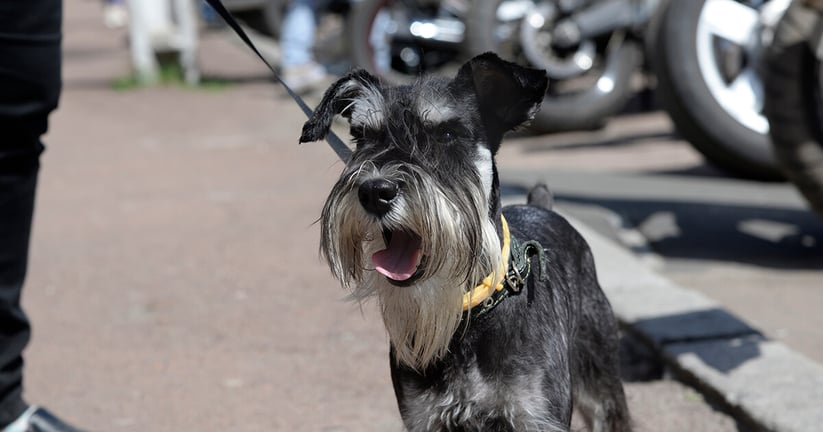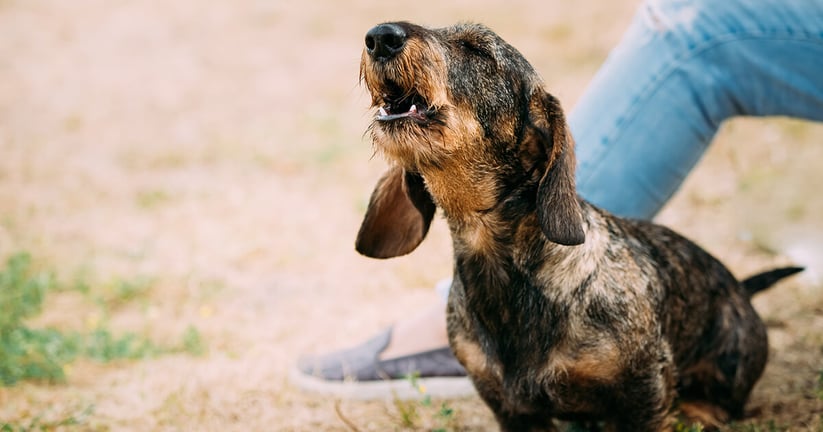Although dogs don’t speak like humans, they have their own way of communicating and make many different sounds in different situations. You may hear your pooch howling, whining, whimpering, barking and growling - and some dogs even purr!
With time, you’ll soon get to know what your pooch is saying - and all sounds have different meanings. For example, some common doggy phrases include:
● Howling: This could be triggered by a high pitch noise; and can be used to call other dogs over a long distance. Some dogs even howl when they hear music - and seem to sing along! This may be triggered by a particular theme tune on the TV or a certain song on the radio!
● Whining: Dogs commonly whine if they want something - for example if they want to go outside for a pee, they might whine whilst standing at the door.
● Whimpering: This may mean your dog is unhappy, or they may be in pain or uncomfortable in some way. While some dogs may just be letting you know that they are not happy with something, you should keep an eye on this, especially if it is an uncommon behaviour for your pet as they may need to visit the vet if whimpering persists. Also watch out for them biting or nibbling a certain area such as their paw as this could be the source of discomfort.
● Purring: When a cat purrs it normally means that they are content and happy; however, this is not necessarily the case when a dog purrs! A dog’s purr is a low grumbling noise which can also mean they are happy, but it can also be a very early warning they are unsettled, like a quiet growl. You will know by their body language which one it is.
● Growling: If your dog starts growling (and it may start with a purr), this is a warning sign that they are uncomfortable with the situation they are in; growling can lead to aggression if not addressed immediately. However, growling can also be a sign of excitement when a dog is playing, listen carefully to the growl, if its short and high pitched it’s more likely to be a sign of excitement.
● Barking: Dogs bark for many reasons - this can be because they are excited and happy, it could be a warning that something out of the ordinary is happening, or they may be barking to get your attention. Again, the situation and your pet’s body language can help you understand the cause.
Does Your Dog Bark and Growl at Strangers? 3 Reasons Why:
Because there can be a few reasons for barking behaviour, if your pet is barking at strangers, it’s important to understand why - and address the barking if it is a negative response.
Some pooches can be very welcoming to everyone, wag their tails, sniff and generally want to have a fuss made of them. For these pooches, barking may simply be a way to say ‘Hi!’ to a new friend. However, other dogs may be more wary and bark and growl at strangers in a territorial, or fearful way, especially if a new person is coming into their home or safe space. Gradual training and reassurance can usually help to solve or reduce barking, but it’s important to be aware of your dog’s history too, as negative barking may be caused by a number of things:
1. They’re not used to strangers
When a stranger approaches, your dog will make a quick assessment of that person by how they look and sound (are they speaking softly, or are they shouting), how they move (are they walking slowly and calmly, or are they running), and how they smell (a quick sniff and your dog can tell if the stranger is friend or foe!).
Your dog may also be wary of young children who make lots of noise and may squeeze them too tightly!
If your dog is not used to meeting lots of different types of people, new meetings can make them nervous or fearful - and cause them to bark! To avoid this, try to train your dog to be sociable from an early age and introduce them to lots of different people so that they learn to be cautious but not to always bark or growl.
2. They may have had a negative experience
If your dog has had a bad experience when meeting someone previously, they may be nervous about meeting other strangers. In this case, make sure that new meetings are gradual and be very patient with your pet. They may just be frightened of what is going to happen next.
To reassure your dog, keep them close to you, on a lead, and reassure them at all times that you know this new person and it’s OK that they come close. Providing a few treats for calm behaviour - or even having the new person give treats - is a good way to encourage your pooch!
They are taking a cue from you
Your pooch is very sensitive and can detect your body language and tone of voice, so the way you react to a stranger will impact their reaction too.
If you are calm and welcoming to new people, your dog will take your lead and probably react the same way. However, if you are anxious - or simply give a loud excited greeting (even if it’s a positive one) your pet will detect this and may become defensive by barking and growling.
Never Punish Your Dog
Remember that when your dog barks or growls, they are trying to get your attention. If you punish or shout at them instead of staying calm and acknowledging what your pet is trying to tell you, they may resort to something stronger to get your attention next time, like biting. Obviously, this should be avoided at all costs.
Reassure Your Pet!
If your dog is barking or growling at a stranger, stay calm and try to reassure them that everything’s OK. Turn your dog’s attention from the stranger to you in a calming voice and reward them when they stop barking.
If you are worried about your pet’s behaviour around strangers, keep them on a lead when walking. If gradual socialisation and training doesn’t work, and your dog continues to bark or growl at other people, you may need to seek help from a qualified behaviourist.
Try Adaptil
If your dog is still nervous and uncertain around new people, even with reassurance, an ADAPTIL Calm On-the-Go Collar can provide additional support and comfort. Releasing comforting messages that help your dog remain confident and calm in new situations; ADAPTIL is proven to support your pet whilst out and about.

